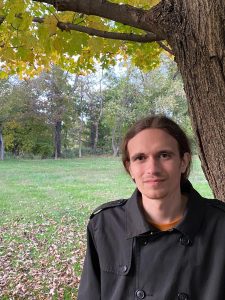
You said we needed a cage. We found one at a thrift store. It was a round cage with a big domed top that reminded me of a mosque or a Russian church. There were three perches inside and plenty of floor space. I’m sure it wasn’t brass, but the bars were that color and set far enough apart to not obscure the view looking in. Nobody wanted it to feel like a prison. We brought it home. It sat on your lap on the ride. It was a nice day and the sun came through the windows and reflected on the bars of the cage. You absolutely tapped your fingers on the bars. When you noticed you were doing it you stopped, looked over to me, and smiled.
We put the cage in the library because it was out of the way but not too out of the way, and it looked good in front of the yellow walls in that room. We had already moved the old end table from your mother’s bedroom set into that room, just for the cage. When we put the cage on it we stepped back to look at it and held hands. It was like putting up a Christmas tree or painting a new child’s room.
After dinner that night we had sex in the bedroom with the window open. I had been on top, and afterwards you rolled me over and playfully pinned me with your hands on my chest. I though it’d be like that, but that’s no way to catch a heart. We both sat up in bed facing each other. You rested your fingers against my chest and then, gently, reached in. My heart hesitated at first. You knew better than to reach for it, just kept your hand still and waited patiently instead. It didn’t take long for my heart to step into your hand and perch on your fingers. You brought it out of my ribcage and I closed my chest as it beat calmly between us. It was easy.
It liked its new surroundings right away, hearts being naturally inclined to small enclosed spaces. You fell into the habit of talking to it, and we gave it time out of its cage every day to perch on our hands and fly around the room. Every time I needed a book from the library, I would admire it the heart, I have to admit, preening or sitting in the bottom of its cage in the sun. It didn’t sing in the morning, but there was a soft, steady heartbeat below life at our place at any time of the day.
Hearts can live for years. When our friends would come over you would show them the library, your face full of pride and happiness any time they showed an interest in my heart. They would stand looking at it sleeping in its cage, laugh with surprise if it happened to turn in a circle. You were patient, letting them look at it as long as they wanted. More than once, a visitor would begin to cry, softly, while looking at the heart, or exhale deep breaths slowly through their lips like blowing out candles on a birthday cake. We would kiss, just once, in the doorway.
I loved going to the museum with you. We would spend the whole day. I loved the people as much as the art: the students sketching in their notepads on the floor, families whispering or talking too loudly, the people standing in front of a single painting to look as deeply into it as one can. There was always at least someone in front of van Gogh’s sunflowers doing that, a lot of times lots of people. But only one room over would be Renoir, women bathing together in water and light. You bought me a postcard once of that one. Do you remember hooking your thumb into the waistband of my jeans while we looked at that painting? I could feel my heart back home doing what hearts do in moments like that.
After we started fighting more often, and then after we stopped, I saved that postcard, packing it with the rest of my things. We divided the books in the library, which didn’t take long. They were mostly mine. My heart watched us from its usual perch. It was time, we agreed. I took off my shirt. Then, maybe after a moment of hesitation for both of us, I undid my belt and stepped out of my pants and underwear. You opened the cage. My heart, again, as always, perched on your fingers. You moved your hand to my chest and rested it there for a moment: your hand, my chest, my heart beating between us. Then you reached in, gentle as before. My heart returned to my body. It seemed to recognize the place.
The other day I was walking in the park by the church when I saw some robins bathing in a puddle. It is still spring. I watched them tilt their heads to listen for worms under the mud. They ran a few steps if they heard nothing to try again in a different spot. If they did hear the thump thump thump of a worm as it pulsed through the body of the planet they plunged their beaks into the mud and, as often as not, pulled him out to beat his dirty body against the ground and eat him. It was a nice day, wet and warm and living.
I don’t know what happened to the cage. I’m assuming that you sold it, or put it outside by the sidewalk with a sign that said “Free.”
Neil Craig Kennedy is a librarian. His book A Jigsaw Puzzle is available from Finishing Line Press. He lives outside Philadelphia.